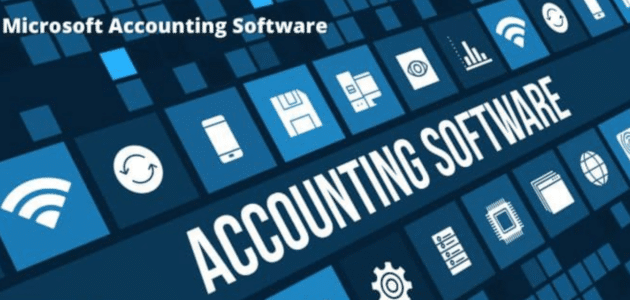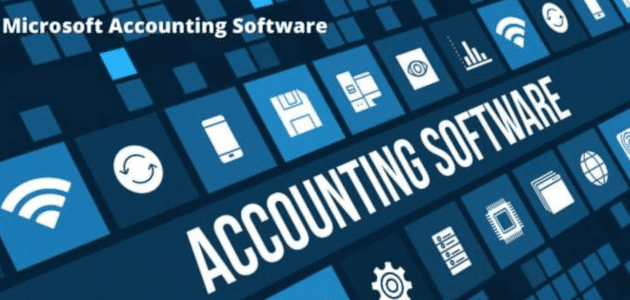A Comprehensive Guide to Microsoft Accounting Software: Streamlining Financial Management – Managing finances efficiently is a cornerstone of any successful business, regardless of size. From small businesses to large corporations, having the right accounting software can make all the difference in ensuring accurate financial reporting, streamlined processes, and regulatory compliance. Among the many options available, Microsoft accounting software has established itself as a trusted solution for organizations worldwide.
This article will explore Microsoft’s accounting software offerings, highlighting their key features and benefits and how they can help businesses stay on top of their financial management needs.

Why Choose Microsoft Accounting Software?
Microsoft is a global leader in business software, and its accounting solutions are renowned for their reliability, integration with other Microsoft products, and ease of use. Here are several reasons why Microsoft accounting software is a top choice for businesses:
- Integration with Microsoft Ecosystem: One of the primary advantages of using Microsoft accounting software is its seamless integration with other Microsoft products, such as Excel, Word, and Power BI. This allows businesses to generate reports, analyze data, and share insights without switching platforms.
- Scalability: Microsoft accounting software can scale to meet your needs, whether you’re a small business or a large enterprise. Its various plans offer flexibility, ensuring that businesses of all sizes can benefit from its features.
- Cloud-Based Options: Microsoft offers cloud-based accounting solutions that allow users to access their financial data from anywhere. This is particularly valuable for businesses with remote teams or multiple locations.
- Security and Compliance: Microsoft’s accounting software is built on its trusted cloud infrastructure, Azure, which provides enterprise-level security and ensures compliance with global regulations such as GDPR.
- User-Friendly Interface: Microsoft’s accounting software is designed with simplicity, making it easy for businesses to onboard employees and use it quickly. The intuitive interface is particularly beneficial for non-accounting professionals needing access to financial data.
Microsoft Dynamics 365 Business Central: The Core of Microsoft Accounting Software
At the heart of Microsoft’s accounting software suite is Microsoft Dynamics 365 Business Central. This comprehensive, cloud-based ERP (Enterprise Resource Planning) system is designed for small—to medium-sized businesses and offers robust tools for managing financials, operations, sales, and customer service.
Key Features of Dynamics 365 Business Central:
- Financial Management: Business Central provides a full range of accounting features, including general ledger management, accounts payable and receivable, fixed assets, and financial reporting. The system is designed to handle multi-currency transactions, making it ideal for businesses operating globally.
- Budgeting and Forecasting: The software allows businesses to create detailed budgets and forecasts, which can be compared against actual performance. This provides insights into financial health and helps companies plan for the future.
- Inventory Management: In addition to accounting, Business Central includes tools that allow businesses to track stock levels, manage supply chains, and optimize purchasing decisions.
- Project Management: Businesses that operate on a project-based model will benefit from Business Central’s project management capabilities. The software allows for tracking job costing, resource allocation, and project profitability.
- Real-Time Reporting and Analytics: With integrated Power BI, Business Central offers advanced analytics and reporting features. Users can generate real-time financial reports, track key performance indicators (KPIs), and gain actionable insights into their operations.
- Automation of Routine Tasks: One of the most significant advantages of using Business Central is its ability to automate routine tasks such as invoicing, payment processing, and expense management. Automation helps reduce human error and frees up time for employees to focus on more strategic activities.
- Integration with Office 365: As part of the Microsoft ecosystem, Business Central integrates seamlessly with Office 365 (now Microsoft 365). This allows businesses to access their financial data directly from Outlook, Word, and Excel, enabling faster decision-making and collaboration.
- Cloud-Based or On-Premise Options: While Business Central is primarily a cloud-based solution, Microsoft also offers on-premise options for businesses that prefer to host their data locally. This flexibility allows organizations to choose the deployment model that best suits their needs.
How Business Central Benefits Different Business Types:
Small Businesses: Business Central offers a scalable platform with a wide range of features for small businesses looking for an affordable accounting solution that can grow with them. It is particularly suited for businesses that need a more robust solution than essential accounting software like QuickBooks.
- Medium-Sized Enterprises: For growing businesses, Business Central provides the tools needed to manage increasingly complex financial operations. Its ability to integrate financial management with other business processes (such as sales, inventory, and customer service) makes it a powerful solution for medium-sized enterprises.
- Global Businesses: Business Central supports multi-currency transactions and international accounting standards, making it ideal for businesses with global operations. Its cloud-based nature also ensures teams in different regions can access the system from anywhere.
- Microsoft Excel: A Versatile Tool for Financial Analysis
- While Microsoft Excel is not an accounting system, it remains one of the most widely used financial analysis, budgeting, and reporting tools. Many businesses use Excel and accounting software to create custom reports and perform detailed analyses.
Key Features of Excel for Accounting:
- Customizable Financial Models: Excel allows users to create customized financial models, budgets, and forecasts. Its flexibility makes it a favorite tool for financial professionals who need to perform detailed analyses.
- Pivot Tables and Data Analysis: Pivot tables in Excel are powerful for analyzing large financial data sets. Businesses can use them to track expenses, monitor trends, and create detailed financial reports.
- Integration with Accounting Software: Excel integrates well with Microsoft’s accounting software, allowing businesses to export data from their ERP system into Excel for further analysis. This combination of tools provides businesses with greater control over their financial data.
- Templates for Budgeting and Invoicing: Excel offers a wide range of budgeting, invoicing, and financial tracking templates. Small businesses often use these templates to manage their finances before upgrading to a full-fledged accounting system.
- Microsoft Power BI: Advanced Financial Reporting and Analytics
- Microsoft Power BI is an essential tool for businesses that require advanced financial reporting and analytics. It is a business intelligence platform that allows users to visualize their financial data, create interactive dashboards, and generate real-time reports.
Benefits of Using Power BI for Financial Reporting:
- Real-Time Data Visualization: Power BI allows users to create dashboards that display real-time financial data. This enables business leaders to monitor KPIs, track financial performance, and make data-driven decisions.
- Integration with Dynamics 365 and Excel: Power BI integrates seamlessly with both Dynamics 365 and Excel, allowing businesses to pull financial data from multiple sources and analyze it in one place.
- Custom Reports: With Power BI, businesses can create custom financial reports tailored to their needs. This flexibility is invaluable for organizations requiring in-depth financial performance analysis.
- Collaboration and Sharing: Power BI makes sharing reports and dashboards with stakeholders easy, ensuring that everyone in the organization can access up-to-date financial data.
- Microsoft Dynamics 365 Finance: A Solution for Large Enterprises
- Microsoft Dynamics 365 Finance is a powerful solution that offers advanced financial management capabilities for large enterprises with more complex financial needs. It is part of the broader Dynamics 365 suite and is designed to meet the needs of large, multi-national organizations.
Key Features of Dynamics 365 Finance:
- Advanced Financial Reporting: Dynamics 365 Finance provides comprehensive financial reporting tools, including consolidating financial statements across multiple entities, currencies, and accounting standards.
- Expense Management: The system includes robust expense management features, allowing businesses to track employee expenses, automate approval workflows, and ensure compliance with company policies.
- Credit and Collections Management: Dynamics 365 Finance includes tools for managing customer credit, processing collections, and automating reminders for overdue payments.
- Compliance and Risk Management: The software ensures compliance with regulatory requirements and provides risk management tools to help businesses manage their financial responsibilities.
Conclusion
Microsoft accounting software offers a wide range of solutions to meet the needs of businesses of all sizes, from small startups to large global enterprises. With Microsoft Dynamics 365 Business Central and Dynamics 365 Finance and the support of tools like Excel and Power BI, businesses can streamline their financial management processes, gain real-time insights into their operations, and make informed decisions.
Whether you’re looking for a simple, scalable solution for managing your finances or a comprehensive ERP system to integrate all aspects of your business, Microsoft accounting software has the tools to help you succeed.

